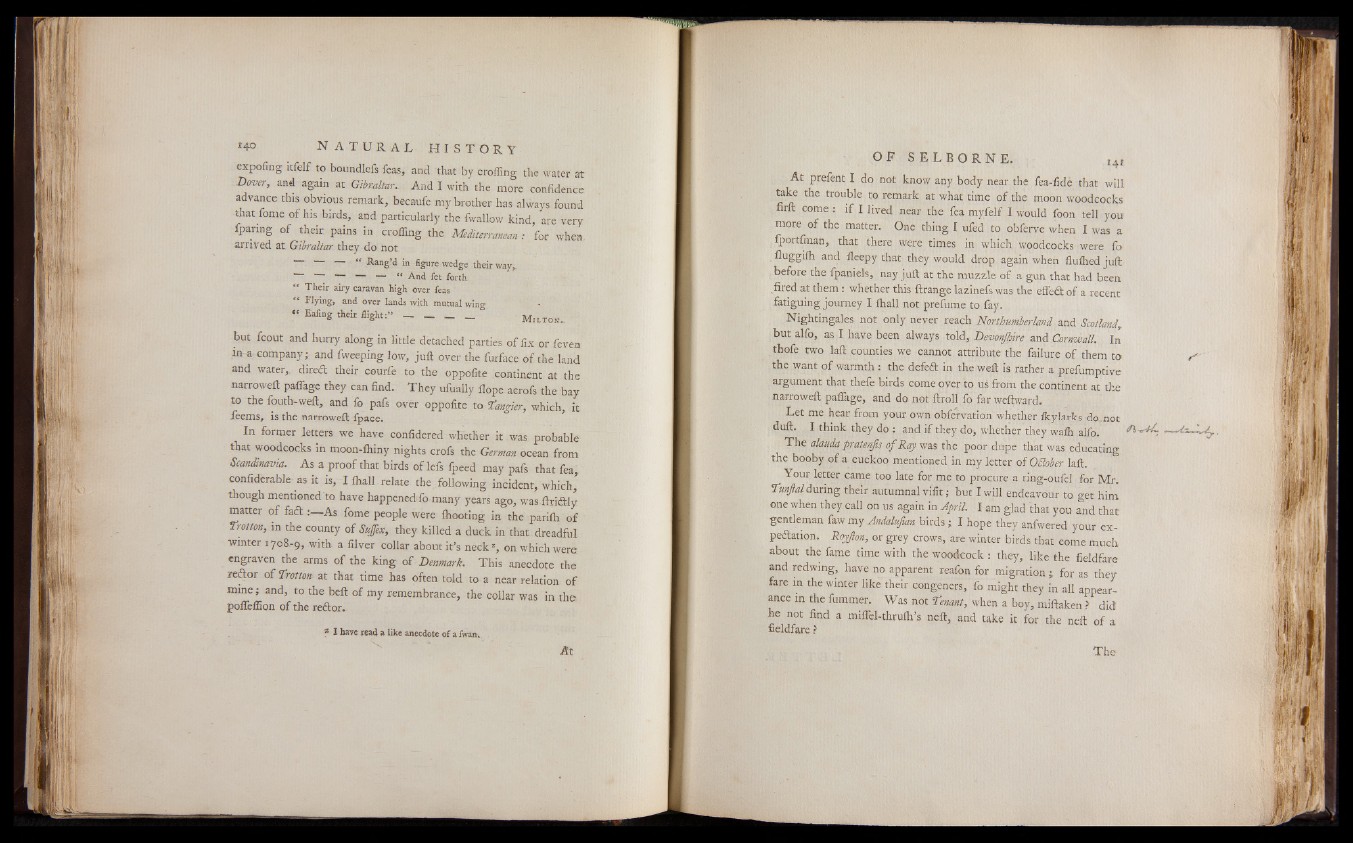
expofmg itfelf to boundlefs feas, and that by crofling the water at
Dover, and again at Gibraltar.. And I with the more confidence
advance this obvious remark, becaufe my brother has- always found
that feme, of his birds, and particularly the fwallow kind, are very
fparing of their pains in crofling the Mediterranean: for when
arrived at Gibraltar they do not
~ " Rang’d in figure wedge their way„
' 1 1— ' 1 1—' “ And fet forth.
“ Their airy caravan high over feas
“ Flying, and over lands with mutual wing
“ Eafing their flight:” ---------------------- Mi l t o n
but fcout and hurry along in little detached parties of fix or feven
m-a company; and fweeping low, juft over the furface of the land
and water,, direft their courfe to the oppofite continent at the
•narrow# paffage they can find. They ufually flope acrofs the bay
to the fouth-weft, and fo pafs over oppofite to Tangier, which, it
ieems, is the narroweft fpace.
In former letters we have confidered whether it was probable
that woodcocks in moon-lhiny nights crofs the German ocean from
Scandinavia. As a proof that birds of lefs fpeed may pafs that fea
confiderable as it is, I lhall relate the following incident, which’
though mentioned to have happenedfo many years ago, was ftridtly
matter of f a d A s fome people were Ihooting in the parilh of
Trotton, in the county of Suffix, they killed a duck in that dreadful
winter 1708.-9, with a filver collar about it’s neck2, on which were
engraven the arms of the king of Denmark. This anecdote the
redtor of Trotton at that time has often told to a near relation of
mine; and, to the belt of my remembrance, the collar was in the
pofiefiion of the redtor.
? I have read a like anecdote of a fwan.
At
At prefent I do not know any body near the fea-fide that will
take the trouble to remark at what time of the moon woodcocks
firft come : if I lived near the fea myfelf I would foon tell you
more of the matter. One thing I ufed to obferve when I was a
iportfman, that there were times in which woodcocks were fo
fluggifh and fleepy that they would drop again when flulhed juft
before the fpaniels, nay j uft at the muzzle of a gun that had been
.fired at them: whether this ftrange lazinefs was the effedf of a recent
fatiguing journey I lhall not prefume to fay.
Nightingales not only never reach Northumberland and Scotland,
but alfo, as I have been always told, Devonjhire and Cornwall. In
thofe two laft counties we cannot attribute the failure of them to
the want of warmth : the defeft in the weft is rather a prefumptive
argument that thefe birds come over to us from the continent at the
narroweft paflage, and do not ftroll fo far weftward.
Let me hear from your own obfervation whether lkylarks do not
dull:. I think they do : and if they do, whether they walh alfo.
The alauda praterffis of Ray was the poor dupe that was educating
the booby of a cuckoo mentioned in my letter of OSober laft.
Your letter came too late for me to procure a ring-oufel for Mr.
Trnjlal during their autumnal vilit; but I will endeavour to get him
one when they call on us again in April. l am glad that you and that
gentleman faw my Andalujian birds; I hope they anfwered your ex-
peftation. Royjlon, or grey crows, are winter birds that come much
about the fame time with the woodcock : they, like the fieldfare
and redwing, have no apparent reafon for migration;, for as they
fare in the winter like their congeners, fo might they in all appearance
in the fummer. Was not Tenant, when a boy, miftaken ? did
he not find a miflel-thrulh’s neft, and take it for the neft of a
fieldfare ?